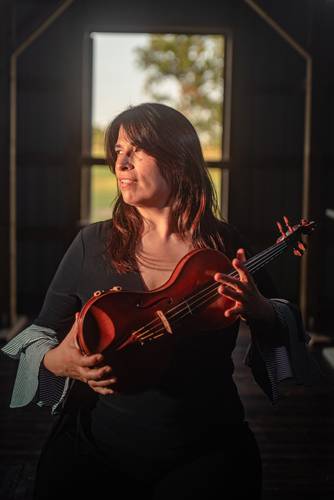Violinist proposes a method to convert stage fright into power situations
How is it that music, an activity that is supposed to be enjoyed and enjoyed, ends up in many cases becoming the opposite and generating fear and even suffering for those who practice it?
According to the violinist and pedagogue Paulina Derbez (Mexico City, 1973), this situation is due to the fact that several of the traditional methods of musical study concentrate only on theoretical and technical aspects, and neglect the physical, mental and emotional particularities of the student. with which they cause not only unnecessary stress and even suffering, but also physical injuries.
.
From that awareness, and from experiencing those situations when she was a student, the composer, also based in Toronto, Canada, dedicated several years ago to developing her own, holistic method, which seeks balance between mind and body to understand, express and enjoy music in its true dimension.
Such a proposal makes up the book The conscious musician, published in 2012, a work that is now enriched with the appearance of a new publication by him: The Invisible Force of Music: Tapping Into Your Mind and Heart Potential for Performance Music, whose official global launch will be today.
Published in English by the Canadian AOS Publishing, this new volume has been well received by important figures of international sound art, such as Aline Champion, first violinist of the Berlin Philharmonic since 2000, and the multi-award-winning composer and producer Barry Goldstein, who has defined as a journey to discover true artistic capabilities and connect with the mystical dimension of music. It is a must read for anyone wishing to explore the deepest realms of musical art and its impact on humanity.
.
Con The Invisible Force of Music, Paulina Derbez proposes a latent renewal within musical education
not only because according to her the new generations of students are in search of new avenues and opportunities, but because there are cases of fear
in conservatories and specialty schools on a global scale.
Students suffer from many physical, emotional and mental tensions, as well as fear, both of the stage and of their classes.
maintains the author in an interview, who details that this new volume, in addition to incorporating her aforementioned study method, includes statistics on stage activity, all pedagogical content
which he learned in his master’s degree in musical pedagogy at the Higher School of Music of Catalonia and the scientific foundations of neuroscience and the so-called intelligence of the heart.
▲ With her book, the Mexican artist Paulina Derbez (in the image) proposes a latent renewal within musical education
.Photo courtesy of the interviewee
I want whoever reads the book to change their relationship with music, their instrument, with themselves and the stage, so that they can be a sound actor or actress. That is, taking you through how to face your study day by day, becoming your best teacher at home, turning stage fright into a moment of power and seeing music not as mere entertainment, but as a way of transformation. This is done through the intelligence of the heart
adds the violinist, president of the Mexican Network of Healthy Conservatories, which will hold its third national meeting on November 21.
Scientific basis
After a few days ago he won the Special Prize at the International Music Competition in Salzburg, which is added to the Honor Prize at the Maurice Ravel Competition in Paris and the third prize at the BTHVN Competition in Vienna, also achieved this year, he explains that heart intelligence is a topic studied for more than three decades by the HeartMath Institute of the United Kingdom, an institution for which she is a certified mentor.
There are thousands of scientific investigations about the power of the heart; It is said to have its own nervous system
he indicates. “Intelligence of the heart is understood as the way to access ‘the wisdom’ within it to regulate emotions and obtain better resilience, which is what is needed both in daily practice and on stage. It is the innate ability of the heart to regulate emotions, and this is done through specific techniques; One of them is congruent breathing, which is not only a breath, but a coherence technique.
For example, if we are very nervous because a concert is coming up, this affects the variable rhythm of the heart and it will send a signal to the amygdala indicating that we are in danger. Then, brain function is inhibited, we cannot carry out activities well, the famous stomach tremors arise. When one performs congruent breathing, the heart manages to regulate its rhythm and make it coherent, and the signals for the amygdala are to send a cascade of endorphins to the body. This achieves a very important physiological change.
In the third part of The Invisible Force of Music, of which it is expected to have a Spanish version soon, Paulina Derbez focuses on the intelligence of the heart and the mission that the musician has to also connect with the heart of the listener: “I propose how through techniques that better connection can be achieved and make ‘harmonic concerts’; That is, concerts where a transformation will happen in the public through music, art, but with a scientific foundation.”
